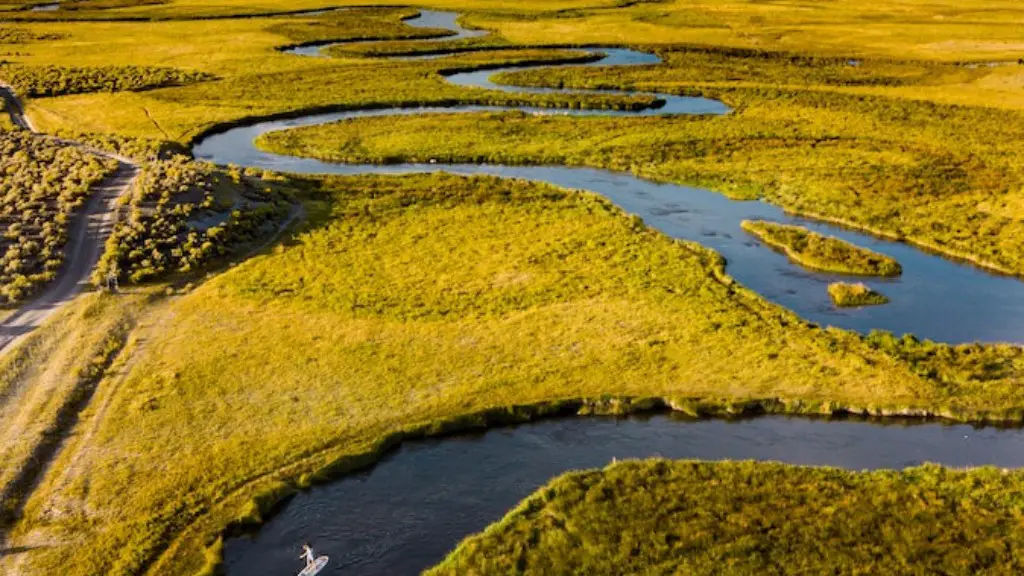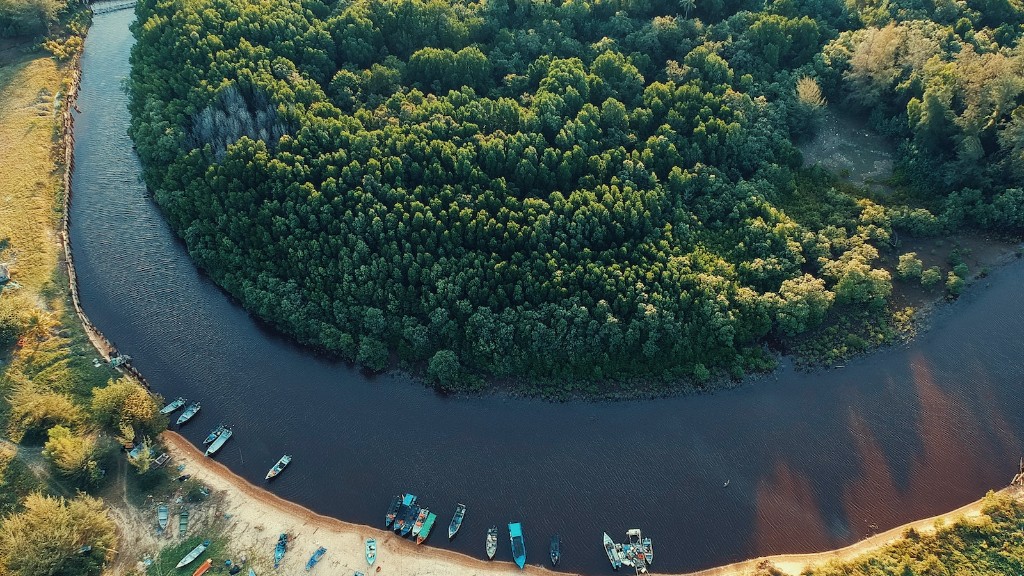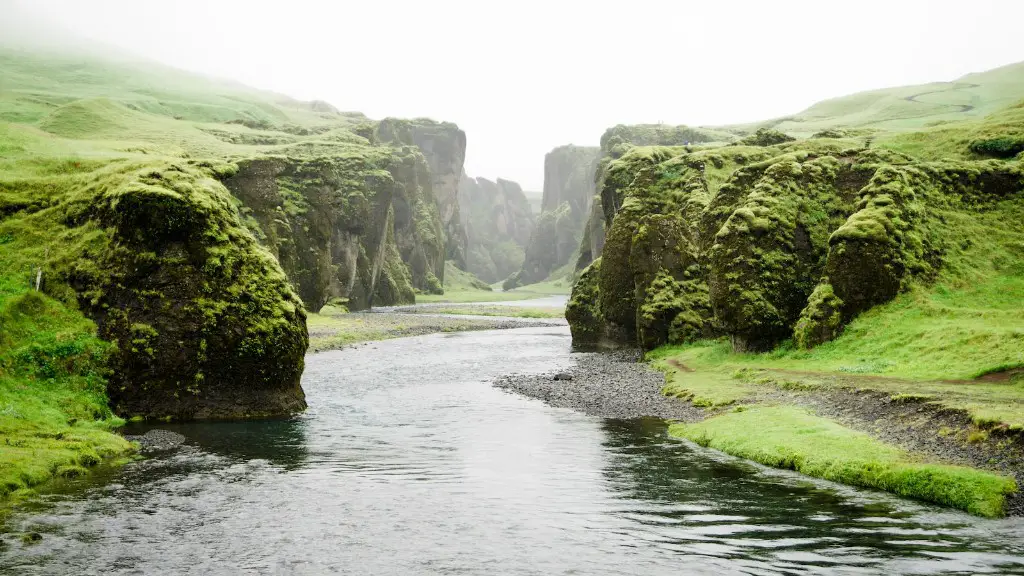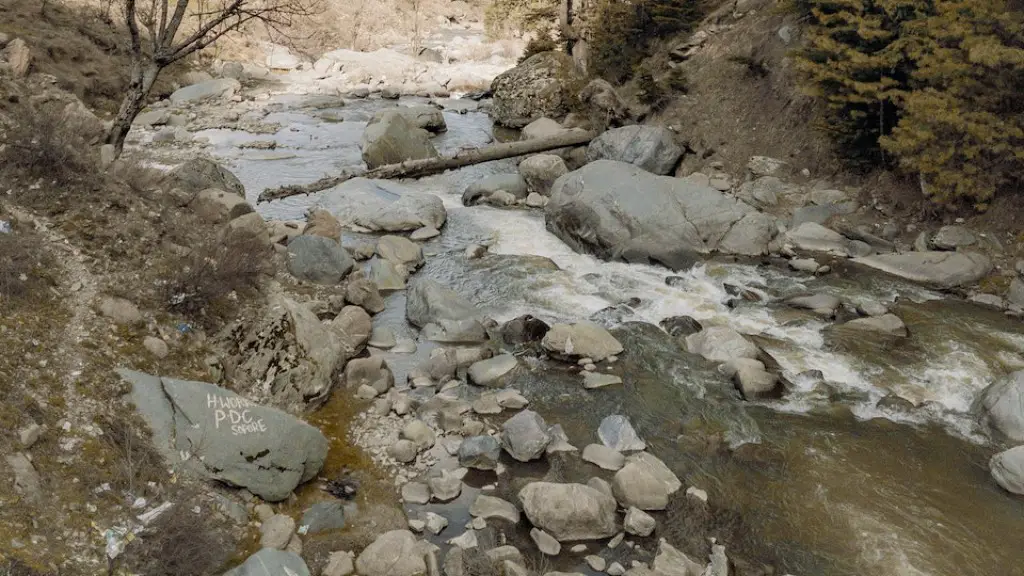Environmental Impact
The Mississippi River has been a major influence on the environment and ways of life for many years. In The Adventures Of Huckleberry Finn, Mark Twain takes readers on a journey down the mighty Mississippi and reveals the true power of this epic waterway. The Mississippi is an important part of the story and the environment it plays a role in, providing the backdrop of the novel’s events.
The setting of the book lies in the backwaters and bayous of the Mississippi. The river provides a scenic and romantic setting and much of the plot takes place on or near its waters. We see both the dangers and adventures that come along with navigating such a powerful waterways. As Huck encounters rafts, inlets, and eddies, we learn about the power and unpredictability of the river.
The river also plays an important role in the development of characters throughout the novel. Huck and Jim use the river as a means of escape from the people in society who, in their view, threaten their freedom. They describe it as a place of liberation, a refuge from the outside world and all its rules and restrictions. As they float downstream, the river serves as an ever-changing backdrop that allows us to witness transformation and growth in the two main characters.
The Mississippi River is also a symbol of resilience. Despite its unpredictable nature, the river continues to flow and provide life to the people and animals that depend on it. From the turtles that Huck and Jim try to catch to the stories of riverboat captains, Twain shows us the great potential of the Mississippi River and the obstacles that it can help overcome.
Economic Growth and Development
The Mississippi River was instrumental in the economic expansion of the United States in the 19th century. The advent of steamboats and paddleboats made it possible to move goods and labor with relative ease between St. Louis and New Orleans, two major cities along the river at the time. With the increased flow of goods and people, businesses could grow and the US economy began to boom.
Twain uses the economic prosperity of his setting as a contrast to the poverty and isolation of the rural areas in the novel. The steamships, dry goods stores and private estates of the river indicate the wealth generated by its currents. Huck’s renewed strength and courage is displayed in his willingness to take take on a raft and use the river as a way to flee his home and embrace the life of a free citizen. He later relies heavily on the river and its currents whenever he needs to escape from a dangerous situation.
The Mississippi also held a large promise for entrepreneurs. Its waters presented an ideal opportunity for people to make money by transporting goods and services along its length. Commerce on the river provided jobs for a countless number of local people. Twain is sure to account for the vast economic benefits of the river in The Adventures Of Huckleberry Finn, creating an unforgettable connection between the river and its inhabitants.
Culture
The mighty Mississippi has shaped the culture of its surrounding regions. Local customs, music and folklore have been passed down along the river and have played a large role in the development of the Mississippi Delta and its cities. Music such as blues, jazz and country have all been heavily influenced by the river. Songs such as “The Steamboat Stomp” and “Didn’t He Ramble” serve as an homage to the power and grandeur of the river.
Twain also portrays the effects that the river had on its inhabitants. We see both struggle and joy as characters traverse the river and try to make their way in the world. Despite these hardships, Twain reveals the powerful hold that the river has over its people, who, despite all odds, are drawn to its beauty and serenity. Huck is particularly affected by his journey down the river, and we are able to witness his transformation from a young, naive boy to a more responsible and thoughtful adult.
Through The Adventures Of Huckleberry Finn, Twain brings us a deeply evocative portrait of life along the Mississippi. From rafts to steamboats and economic opportunities to cultural growth, it’s easy to understand why the river is such and important part of the story.
Natural Resources
The Mississippi River has long been a valuable source of natural resources. Its waters provide food, habitat and transportation corridors to countless plants and animals, including fish, waterfowl, mussels and turtles. These resources are essential to both local communities and the larger ecosystem, helping to sustain a diverse population of plant and animal species.
In the novel, we see Jim and Huck continually relying on the river’s resources for their needs. They try to catch and eat fish and hunt ducks to supplement their meager food rations. We also see them travel by raft, using the currents of the river to move them quickly and efficiently along their journey. The river is a major part of the novel’s landscape and without it, the story could not have taken place.
The importance of the Mississippi River can also be found in its Native American and Cajun heritage. For centuries, these cultures have lived along and depended on the river for their livelihoods. Huck and Jim often come in contact with these cultures during their journey, and the characters respect and admire their way of life.
The Mississippi River is the lifeblood of Huckleberry Finn and has served as an important source of sustenance, culture and recreational activities for generations. Without its meandering waters, there would be no story.
Importance of Preservation
Today, the river and surrounding lands face dangers from pollution and habitat destruction. The Mississippi River has been subjected to increasing development, and the journey that Huck and Jim took is no longer possible. It is important to recognize the importance of preserving these areas and their wildlife, which so greatly impacts the people that depend on its resources.
Twain’s novel is a powerful reminder of the importance of the river and its role in our society. We see the resilience of the river in the face of adversity and the power of its inhabitants to overcome any obstacle. The story of Huckleberry Finn has been an inspiration for many and its message still resonates today. It’s up to us to preserve the beauty and power of the Mississippi River for future generations.
Political Showdown
The Mississippi River also serves as a symbolic backdrop for the political conflict between society and democracy in The Adventures Of Huckleberry Finn. Huck and Jim’s journey is a stand against the entrenched systems that attempt to limit their freedom and force them into submission. A riverboat captain and others attempt to bring Jim back into slavery, but Huck stands firm in his convictions and ultimately triumphs. This is an important part of the story and a strong reminder of the power that democracy can bring. It shows how one person can inspire change and incite a revolution. It also serves as a reminder of how powerful the Mississippi can be in the face of danger.
The river also serves as a source of strength for Huck, who despite his young age, is able to take control of his destiny and use the powerful currents of the Mississippi to escape the world that he was born into. We see Huck overcome his doubts to become a man with conviction and fortitude, ultimately coming out victorious over the rigid societal norms that sought to hold him down. Together, Huck and Jim serve as powerful representations of freedom and self-determination, setting an example for generations to come.
Education
The Mississippi River provides an important lesson in appreciation and understanding of nature. Twain’s novel gives us a glimpse into the life of the river and the various people, animals, and plants that inhabit it. From Jim’s knowledge of herbs and birds to Huck’s admiration of the beauty of the river, the novel serves to educate readers about the importance of the environment and the power of nature. It also serves as a reminder of how powerful the Mississippi River is and the role that it can play in people’s lives.
The US government has recognized the importance of the Mississippi River by protecting it through laws such as the Clean Water Act and initiatives such as the America’s Great Waters program. This has helped to preserve its natural resources and maintain its unique ecosystems. It is up to us to continue to respect, guard and appreciate this special waterway, so that future generations can continue to enjoy its beauty.
Conclusion
The Mississippi River plays an important and memorable role in Mark Twain’s novel, The Adventures Of Huckleberry Finn. From its natural resources to its historical and cultural significance, the river provides the backdrop to an unforgettable story. It is both a symbol of freedom and a source of strength and resilience. We can learn a great deal from the river and its importance must never be forgotten. It is up to us to preserve and protect its beauty for generations to come.





